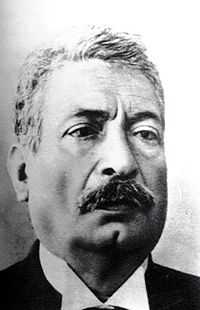Dawood Hosni

Dawood Hosni (also spelled Daoud / Dawoud Housni or Hosny, Arabic: داود حسني née David Haim) was an Egyptian musician and composer born in 1870 in Cairo to a Karaite Jewish family. He composed the first Operetta in the Arabic language.
Biography
Dawood's father, Khidr Hossnei, was a jeweler. Dawood was apprenticed to a bookbinder, Sukkar Bookshop, at the age of ten; a customer, Sheikh Mohammed Abdu, encouraged him to study music and singing. His father did not want him to become a musician but he traveled to Mansoura, where he studied under the composer Mohammed Sahabaari. He learned composition and oud, and when he returned to Cairo, sang the compositions of Sheikh Mohammad Abdelrahim (known as al-Masloub). At the age of twenty, he composed in the forms of adwar, taqtuqa, and qasida, imitating the singing style of Mohammed Uthman. In 1932, he was selected to record the works of Mohammed Uthman.
He was also the composer of the first Egyptian opera, "Shamshoon and Delilah".
Dawood Hussnei composed ensembles for many theatrical musicals for Ukasha, Muneera al-Mahdia, Naguib al-Rihani, Ali al-Kassar, and Muhammed Bahgat, such as "Marouf al-Askafee", "Sabah", "al Brensissah", "al Layalee al Milah", and "al Ghandoura". He was also a teacher to Umm Kulthum and Amal al-Atrash whom he called "Asmahan".
Hussnei's first wife, Qamar ('Moon') died young. It is possible he composed the song 'Qamar al Layli' ('Moon of Many Nights'in the maqam rast) in her honor. He married a second time, in 1920 and had two children, neither of whom became professional musicians. The last professional work Hussnei did was for a musical program for the National Radio Station. He died in 1937.
His son, Yitzhak HaLevi (Abu Badia) made Aliyah to Israel, and on December 1977 participated in the peace talks between Israel and Egypt that were held at the Mena House in Egypt [1]
See also
References
- ↑ ח-גי, המקרה המוזר של ירמיהו שפי, דבר, טור 2, 18 במרץ 1981.
- Zaki, Abd al-Hamid Tawfiq (1990). The Leaders of Arabic Music across 150 years (Alam al-musiqa al Misriyah abra 150 sanah (Tarikh al Misriyin)). Al-Hayah al-Misriyah al-Ammah lil-Kitab. ISBN 977-01-2423-0.